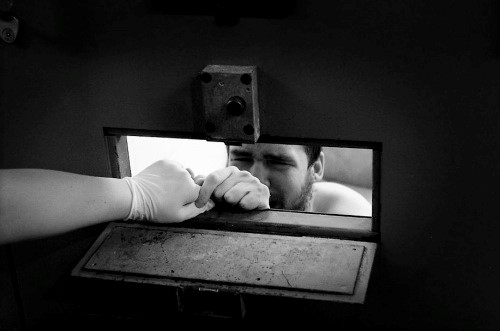
As Jews all over the world observed the atonement rituals of Yom Kippur this week, I decided to dedicate my fast to the roughly 80,000 prisoners currently being held in solitary confinement. The mindful fast coincided with a day of action against the use of solitary confinement across the country, including a protest in the Bronx, a demonstration in front of the Pelican Bay State Prison in northern California and a performance of the anti-solitary confinement play If the SHU Fits in Los Angeles (“SHU” stands for Special Housing Unit - the formal name for solitary confinement).
These coordinated events are part of a growing national campaign to raise awareness about and combat the excessive use of solitary confinement in state and federal prisons by holding actions on the 23 of each month. The date is chosen in reference to the roughly 23 hours per day that many prisoners in solitary confinement spend alone in their cells. (The other one hour per day is often also spent alone in an enclosed exercise space.)
This year, as Yom Kippur happened to fall on September 23, I had the unique experience of combining my personal act of repentance with focused attention on the plight of tens of thousands of people who are held in solitary confinement. While we generally think of solitary confinement as a last-resort measure for only the most dangerous of criminals, the truth is that it is often employed for reasons as arbitrary as violating minor prison rules or for “involuntary protective custody” for suspected gang members, minors, LGBT people and the mentally ill. Prisoners in solitary confinement are entirely shut off from regular communication with others, and at times all they can hear are the cries of anguish and despair coming from adjacent cells. The long-term physical and psychological trauma inflicted by solitary confinement is extremely well documented.
As I reflected on these conditions yesterday, I was reminded of the Haftarah portion we traditionally read on Yom Kippur. In Chapter 58 of the Book of Isaiah, God asks: “Is such the fast I desire,/ A day for men to starve their bodies?/ Is it bowing the head like a bulrush/ And lying in sackcloth and ashes?” (verse 5), and answers “No, this is the fast I desire:/ To unlock the fetters of wickedness,/ And untie the cords of the yoke/ To let the oppressed go free;/ To break off every yoke” (verse 6). The lesson I draw from this passage is that true atonement never comes from afflicting ourselves, but rather from trying to lessen the pain of others.
Why, then, do we subject our prisoners to the torture of solitary confinement in the name of their punishment and reformation? Should we not rather be pursuing a criminal justice system that prioritizes rehabilitation and respect for basic human dignity? And can our prayers for forgiveness truly be heard while immoral practices like solitary confinement continue?
Yom Kippur has passed, but the fight against solitary confinement goes on. As we enter 5776, let’s choose to learn more about the damaging effects of solitary confinement, to talk about the need for real criminal justice reform in our country, and to take part in local and national actions against solitary confinement on the 23 of each month. In this way, we can begin to work towards the true atonement for ourselves and others that God instructs in the Book of Isaiah.
Related Posts

Remarks from Rabbi Eliana Fischel at Jewish Gathering for Abortion Access

Teens from North Carolina Speak About Environmental Justice

